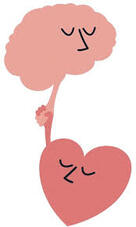 Best Friend Know Each Other Well! Best Friend Know Each Other Well! Life is a balance. Each of us have faced our ups and downs, positives and negatives, good and bad, failures and success and misery and joy. If you try to draw a graph of your emotions and experiences, it would be a V-shaped one for most of us with positives and negatives altering between each other throughout life’s journey. The quality of life is defined by the number of positives over negatives. Some feel satisfied with their life and some others are greatly displeased with it. How you feel emotionally impacts your heart health greatly. Our heart and brain are located in two very different positions and the studies dealing with them, cardiology and neurology respectively, are also completely different. Despite these differences both the organs are interconnected to each other. Emotion is a strong feeling which is a result of one’s mood, relationship or circumstance. These emotions affect the brain which in turn affect the heart.  Loneliness Disturbs Emotional Balance Loneliness Disturbs Emotional Balance Two Sides of a Coin Stress can be a motivator sometimes helping you get things done and a demotivating factor some other times leading to tiredness and heart disease. What each of us must do is to worry less and feel better which helps to reduce stress greatly. It was not more than a century ago that a scientist found a common pattern of death between husband and wives-both died within a year of one another. It was not a time when stress, brain health and its impact on the heart were widely known. But now, people are desperately seeking for peace and solace in this power- and money-dominated world. Various studies show that despair and stress affect health, specifically heart health. One of great interest is the Takotsubo cardiomyopathy or the broken-heart syndrome which was not discovered until 1990. Most interesting is that this syndrome is mostly exclusively present among the women population and mimics a heart attack. Death of a spouse, financial problems, domestic violence or an unexpected emotional event triggers the syndrome. Such triggers change the shape of the heart to resemble a traditional Japanese pot called the takotsubo used to catch octopus. Read more about the syndrome and understand its effect on heart health by visiting the website www.firsteatright.com. Staple causes of heart disease have been analyzed but what scientists and physicians are missing out is to understand emotional factors such as tangled relationships, work stress, poverty and economic crisis that can trigger a heart disease. An Organ of Fascination Our heart is the only organ that has an independent electrical supply which can continue to function even outside the human body and survive up to four hours. It can pump blood up to 1,00,000 kilometers of blood vessels. A human heart beats three billion times averagely in a human’s life in accordance to the fact that a woman’s heartbeat beats faster by 8 beats per minute compared to a man’s heartbeat. Such a masterpiece of nature requires utmost care but sadly heart disease due to malfunctioning of this vital organ remains as the number one cause of death worldwide. Recent studies show that depression can double the risk of dying from heart disease even in those who don’t suffer from any prior heart problems. All the more, people who suffer from a heart failure as well as depression are twice likelier to suffer from worse symptoms. While more common in women with heart failure, depression can play a severe role in men with heart failure. Social isolation and loneliness are also other factors that worsen the risk of a heart failure. Its easier for physicians to deal with high LDL cholesterol levels and blood pressure levels as a risk factor for heart disease but most don’t know to tackle depression, stress or isolation likewise. Any imbalance in emotion is a trigger for a heart problem. Women are likelier to suffer from depression and heart problems that arise as a result of the same but are least bothered to allocate time for exercise or stay healthy. They prioritize kids, husband and house chores before their health which needs immediate intervention. Luckily, depression is a treatable problem that can be sorted out through medications and psychosocial therapy. Each of us need to find out ways through which we can control our fears, anxiety and stress which in turn imposes less stress on the heart. A new way to deal with emotion-related heart effects called as cardiac psychology is becoming famous. Reroute your brain’s thinking strategy and be blessed with a healthier heart as a result. Few ways for effectively doing it include: Meet a physician: Stress, anxiety or depression is common among the population, but one needs to know where to draw a line. Emotions are common to humans and those that take a peek into your life rarely are admissible but if the same emotion keeps haunting you day in and day out its time to meet a physician and seek treatment. Psychosocial Treatment: Psychiatric treatments are available since a long time and now its appreciable that we focus on stress management, counselling and relaxation techniques along with newer treatment methods such as acceptance and commitment therapy and expressive writing that can prove to be helpful. Exercise: Exercise provides us with various important benefits, but we never explore and utilize it properly. There are various studies proving that exercising for at least three days in a week improves well-being and cognitive skills in older adults. Aerobic exercise helps you think faster and clearer. Exercises such as walking, jogging, cycling, swimming, dancing and gardening reduce anxiety, depression and improve self-esteem. That’s because of improved blood circulation to the brain. Now, if you suffer from depression, stress and anxiety it is better to talk with your physician, especially a cardiologist who can suggest a good solution. Maybe meeting a psychiatric and analyzing practical ways to improve your well-being and protecting brain health is the right way to start dealing with the problem. Comments are closed.
|
AVOID FRAUD. EAT SMART.+91 7846 800 800
AuthorDietitian & Nutritionist Dr. Nafeesa Imteyaz. Archives
November 2022
Categories
All
Dr. Nafeesa's Blog @blogspot |
- Home
- Written Testimonials
- Consult
- Clinics
- Blogs
-
Diet & Nutrition
- Diabetes Reversal
- IVF IUI not needed for PCOS PCOD Infertility
-
Medical Nutrition
>
-
Disease & Conditions
>
- Infertility | PCOS
- Diabetes Mellitus
- Cholesterol
- Hypothyroid
- Kidney Problems
- Hypertension
- Cardiovascular Diseases
- Liver Diseases
- Gastro intestinal disorder
- Cancer
- Metabolic Disorders
- Orthopedic Disorders
- Eating Disorders
- Dietary Recall
- Weight Record Filled By Clients
- Online Payment Transaction Details
- Online Clients Weight Check Form
- Our Program Package Service Charges
- Weight Record 2017 Clients
- Measurements sent by Clients
- Terms & Conditions Of Payment
- Thanks. Your Form is Submitted
- Video Testimonials
- Lifestyle & Wellness
- Lifestyle & Wellness Blog
- Allergy & Intolerance
- Weight Loss / Gain
- Weight Loss / Slimming Blog
-
Disease & Conditions
>
- Life Cycle Nutrition >
- Sports Nutrition >
- Integrity in Nutrition
- Knowledge Centre
© COPYRIGHT 2022. ALL RIGHTS RESERVED. FRST HEALTHCARE PVT LTD.
Dr. Nafeesa Imteyaz of First Eat Right clinic, is the Best Dietitian Nutritionist in Bangalore. Best Dietitian Nutritionist in Pune. Best Dietitian Nutritionist in Hyderabad. Best Dietitian Nutritionist in Chennai. Best Dietitian Nutritionist in Mumbai. Best Dietitian Nutritionist in Delhi. Best Dietitian Nutritionist in Kolkata.


